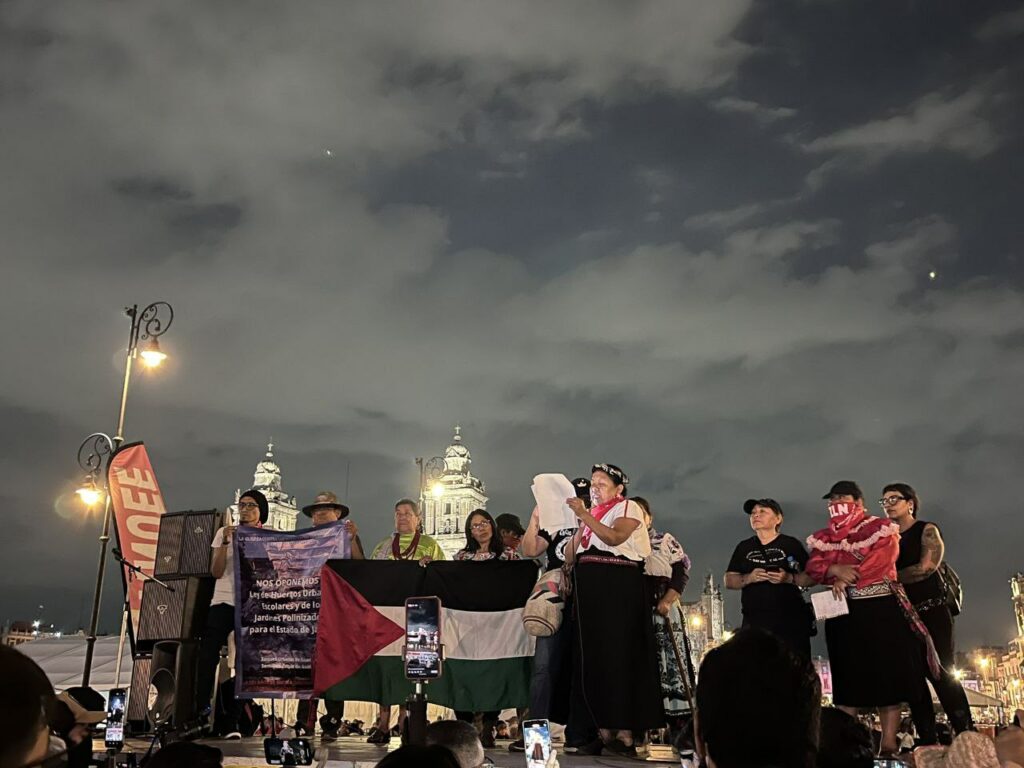
Gilberto López y Rivas
531 years after the arrival of Europeans to the island lands of this continent, which would happen to bear the name of America, the organizations of native peoples took to the streets to express their repudiation of the euphemisms of discovery, encounter of two worlds and acculturation to denote the violent process of conquest and colonization, which the National Indigenous Congress describes as the worst genocide in the history of mankind.
Let us remember that in a first meeting, in Bogota, Colombia, on October 12, 1989, and in a second meeting in Guatemala, two years later, the indigenous organizations managed to unify a heterogeneous group of ethnic, social, trade union and political entities within a plurality that was manifested in the decision to incorporate the black and popular sectors, in what would be, from then on, the 500 Years of Indigenous, Black and Popular Resistance Campaign.
Despite the contradictions surrounding the political concepts and strategies to be followed, this campaign at that time opened channels of communication between peoples of indigenous America, with a space of confluence in which they reflected and carried out coordinated actions and work based on six central objectives: 1) to carry out a collective reflection on the impact of the European invasion and colonization; 2) to recover and strengthen historical memory as the basis of identities as peoples; 3) to promote, consequently, a vast movement of self-discovery of the roots and scope of struggles and resistances; 4) to elaborate and put into practice pluralist and democratic alternatives of existence and government to the systems of exploitation, domination and oppression imposed by the invasion and colonialism; 5) to convert the participants of the campaign into actors of their own destiny, consolidating their regional, national and continental organizations, on the basis of an active autonomous protagonism from below; 6) to promote the broadest unity of all the organizations, making the campaign a space of encounter and confluence of diversity and otherness.

With these objectives, and facing the repressive actions of the national governments and the onslaught of the capitalist corporations, already in the neoliberal stage of capitalist accumulation, the campaign meant a real questioning of the festive and deeply racist character that the governments of the Iberian Peninsula and Latin America intended to give to this historical event. It placing at the center of the debate the reality of the Afro-descendant and native peoples, characterized by the maintenance of structures and mechanisms of subordination and domination that reliably describe what Pablo González Casanova called internal colonialism, and which are also expressed in practices of racism, discrimination, ethnocide, segregation and extermination of indigenous and Afro-descendant peoples, which hinder the exercise of rights and the construction of a society based on justice and equality, as stated in the report of the Third Continental Meeting of Indigenous, Black and Popular Resistance, held in Managua, Nicaragua, in October 1992.
Particularly important in this process was the historical retrospective that was imprinted on the campaign, as a platform of support for the reaffirmation of identities denied by European racism and ethnocentrism, and by that of Latin American elites, in such a way that organizations of peoples of African descent had the opportunity to analyze their historical experience of conquest and colonization, and strengthen their struggles against racist policies throughout the continent. The discussion covered the whole process of identity formation that took place since the European conquest, and the formation of Latin American nation states, with the forging of nationalities that, over time, became majority populations in our countries. Sectors of these national groups share the racism and ethnocentrism of the colonial elites, denying, today as yesterday, the right to linguistic and ethnocultural difference, and reproducing within our national societies, a discriminatory assimilationist/integrationist system.
By the way, the counter-celebrations initiated by the campaign gained followers in those years even in Spain, where committees such as the Me cago en el V Centenario (I Shit on the Fifth Centennial) were organized, and even mayors of several cities denounced the hypocrisy of their country’s government and the geopolitical and economic purposes of the official activities, and declared themselves in favor of the victims of Spanish colonialism.
531 years after the invasion, the people demanded a stop to the war, calling for resistance against militarized and criminal recolonization.
Original text published in La Jornada on October 13, 2023. https://www.jornada.com.mx/2023/10/13/opinion/023a2pol
English translation by Schools for Chiapas.
